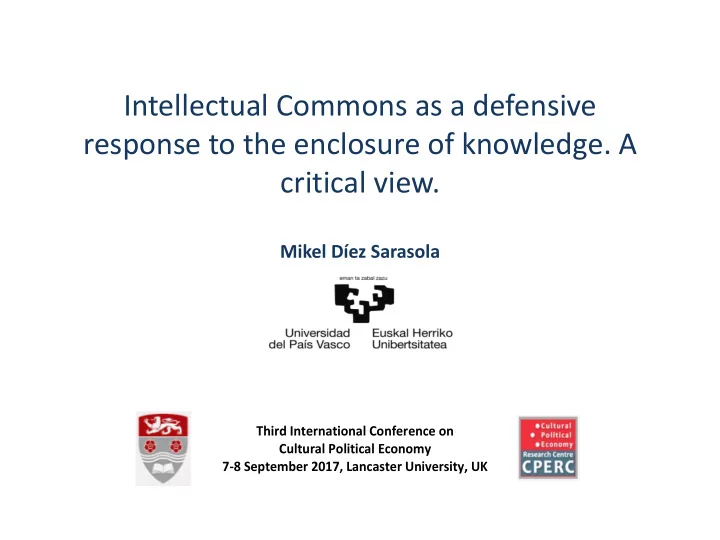

Intellectual Commons as a defensive response to the enclosure of knowledge. A critical view. Mikel Díez Sarasola Third International Conference on Cultural Political Economy 7-8 September 2017, Lancaster University, UK
Emergence of multiple Intellectual Commons
Expansion of proprietary material • By commodifying knowledge previously in the public domain. (living materials by isolation – Chakrabarty-, term extension) • By appropriation of traditional knowledge of (indigineous) communities. • By expanding IPRs owner prerrogatives to restrict uses of property material: – research and experimentation. – User and enjoyment of protected works (DMCA) • By expanding territorial/spatial enforcement of IPRs (TRIPS)
Second Enclosure? • Some authors observe similarities with the enclosure of Common land in England in the Eighteenth century
Tragedy of the commons: not so tragic • Tragedy of the commons related with problems of overuse and underinvestment (Garret Hardin) • Elinor Ostrom. Commons no so tragic.
Intellectual Commons: same family? Traditional Commons • Unlike knowledge, tangible assets are limited and rival Conflict based on its limited use. Traditional commons answer the question. Who takes what? Sequence of the debate: 1. Res nullius 2. Property / Commons Collective Private 3. Tragedy of the Commons enclosure individual private property 4. Eventual commons contradicting the announced tragedy of the commons. (Olstrom).
Intellectual Commons: same family? • Intellectual Commons is a response to a different issue. • Unlimited. Non-rival. Social value of knowledge: cumulative & network effects. • Different terms of debate: Not a limited-resources issue. which incentive to maximize social welfare? public domain – artificial scarcity (IP)- propertization. • Sequence: 1. Public domain. 2. Commodification. 3. Privatization. 4. Commons as a defensive reaction against excessive expansion of IP.
Expansion of IPRs. Tragedy of anticommons • Material and spatial expansion of IPRs generates contradictions and shortcomings: – Issues of erosion of experimentation. Madey v. Duke University, which greatly limited the scope of the experimental-use exception. – Impairment of academic activity. Availability of materials and knowledge. – Blocking follow on innovation. – Undermining access to culture. – Misappropriation of traditional knowledge • Contradictions of the capitalist system. For each capital wishes to pay nothing for its knowledge inputs but wishes to change for its intellectual output (R. Jessop) • Tragedy of the anticommons.
Critical approach to Intellectual Commons as the solution to the shortcomings of IPRs regime • Commons approach some beneficial perspectives: collective and ecological approach. • Intellectual Commons does not face an objective scarcity but an artifical legal made scarcity. • It does not question today’s IPRs configuration. Determinism. It equates the objective limitation of tangible assets to the more than questionable social and contingent institution of IPRs. • IPRs as the result of social relations. • What about adjusting the scope of IPRs themselves?
Recommend
More recommend